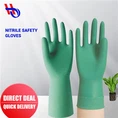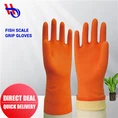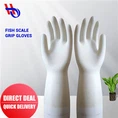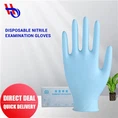Latex Galoshes
What is Latex Galoshes
Galoshes must be waterproof. They're generally made of rubber (or foamed neoprene) and typically slip-on, though some have laces to improve the fit. They can be insulated or not, and depending on the style, they may be from ankle height up to almost knee height. They're extremely common on farms and boats due to their comfort and the ease with which they can be hosed off at the end of a long day.
Advantages of Latex Galoshes
Variety of rain boot colors
Although black or other solid colors have traditionally been the most popular and classic color of rain boots, other candy colors, such as bright pink, eye-catching yellow, shiny green, and so on, have grown popular since last year. It adds the bright landscape in the rain and also exhibits the personal way of clothing, which strongly stimulates their desire to buy a pair of the best rain boots and to meet their sense of satisfaction.
Diversity of appearance styles
Especially for women's boots, there are thousands of options waiting for you, also most of them are belongs to classic rain boots. Such as the tall boots, which would be very nice for wet and muddy conditions, especially sometimes we will add the waterproof leather upper, the stylish boots not only fashionable but also keep feet warm and dry all the time in cold weather.
Variety of rain boot patterns
Although solid-color designer boots with no printing have always been the best seller in the market, it is no longer limited to a single design, colorful flower patterns, exquisite animal prints, or unrestrained geometric patterns are all available. Rain boots can complement apparel by bringing style and individuality to it.
Meet the needs of different market positioning
Different consumers have different definitions of rain boots, some require function first, some require appearance first, and some require price as a priority. Different designs and patterns may well attract consumers of different ages, genders, occupations, and hobbies to meet their unique needs and improve the market coverage and sales potential of products.
Why Choose US
Our factory
Beijing Huateng Rubber and Plastic Latex Products Co., Ltd. was established in 1958. The company has excellent performance in China's latex impregnation products. The registered capital of the Company is 120 million yuan, and the value of fixed assets is 258 million yuan. The annual turnover exceeds 800 million yuan.
Our Product
We mainly develop nitrile protective gloves and neoprene protective gloves. At the same time, our company provides different kinds of work gloves, protective gloves and waterproof boots to the domestic and foreign markets.
Our certificate
The company has passed ISO9001: 2015 quality management system and ISO14001 environmental management system certification. Latex gloves have passed EU CE certification
Production equipment
It has strong scientific research and development ability and technical testing means, and the factory has complete industrial sanitation, labor protection and fire protection facilities that meet the environmental protection standards.
Powerful industrial production utilities
Power supply capacity is 4250KVA, and water supply capacity is 240t/h circulating water capacity. 300t/h, heating capacity 32t/h, the water supply and drainage facilities in the plant area are complete and connected with the municipal pipe network.
Materials Used in Galoshes
Rubber
Rubber is a natural material obtained from rubber trees. It is known for its excellent waterproof properties, flexibility, and durability. Rubber galoshes are often preferred for their resistance to water, mud, and various weather conditions. They are also relatively easy to clean and maintain.
PVC (polyvinyl chloride)
Pvc is a synthetic plastic material widely used in rain boot manufacturing. It offers excellent waterproofing capabilities, durability, and affordability. Pvc galoshes are known for their flexibility, lightweight nature, and resistance to chemicals and abrasion. They are available in a wide range of colors and designs.
EVA (ethylene-vinyl acetate)
Eva is a foam-like material known for its lightweight and cushioning properties. It is often used in the midsole or insole of galoshes to provide comfort and shock absorption. Eva galoshes are lightweight, comfortable to wear, and can be easily molded into different shapes.
Pu (polyurethane)
Pu is a versatile synthetic material that can mimic the properties of rubber or leather. It is commonly used in galoshes to create a more stylish and fashionable look. Pu galoshes are known for their flexibility, durability, and resistance to water. They offer a wider range of design options and are often considered more lightweight and comfortable compared to traditional rubber boots.
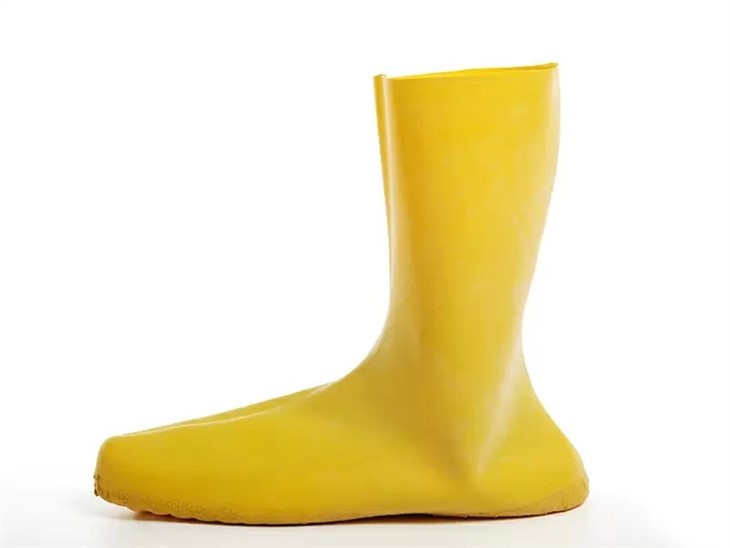
The Production Process of Rain Boots
Mixing the main components
The natural rubber is mixed together with other components, namely carbon black, fillers, oil, and curatives. They are fused either in an open-top mill or enclosed mixing machine. Precise measurement is extremely essential in the stage of weighing out the ingredients to guarantee that the preferred physical properties of the mixture are attained.
Outsole calendering
The sheets of uncured rubber or pigs are drawn from the store and heated up on a mill to prepare them to be soft. Once they reached the required smooth and soft texture, they are then fed through the outsole calender.A calender is formed by a series of metal rollers that process uncured rubber to a specific gauge and roll a pattern onto the surface of the rubber. Heated knives are used to carve out the wanted sole size in the aftermath of cutting around the template.
Upper calendering
As mentioned earlier, the pigs from the store are heated up on a mill and dispensed in the upper calender. The “upper” part relates to the thin external layer of rubber on the rain boot. Not like the “outsole” part, which leaves a perfectly smooth finish on the rubber's surface.As the rubber is being fed into the calender, a continuous thin sheet is wound up onto drums. Then different parts are cut out from the continuous layer of the upper rubber.
Molding of the heel
In this stage, the rainboot heel is molded through compression. This is accomplished through placing a tiny piece of pre-weighed uncured rubber or called a slug into a mold cavity that is then compressed under high pressure and simultaneously heated.
Skimming and friction calendering
The term skim refers to the canvas lining inside the rain boot. It has a coat of rubber skimmed onto the surface that creates a solid bond with other rubber elements. On the other hand, the term friction pertains to the process of weaving rubber canvas for a reinforced internal layer.
Assembling of boots
In this phase, the assembly line workers build up the rubber boots layer by layer, entirely by hand. The assembly chain is a long slender table that has a chain rotating around the outer side with lasts sticking up in the air. It stops for a limited time at each station where an individual is situated to do a specific task.
Vulcanization
In this stage, the lasts are removed from the assembly chain and packed on a boot trolley. The group of rain boots is shoved into a large oven called a vulcanizer where they are cured by heat and pressure. Once the process is done, the boot trolleys are removed, and the rain boots are pulled off once the aluminum lasts have cooled down.
How to Choose Galoshes
Climate
First off, you need to assess the general weather of where you live. The climate in your area will help you determine the best option for you. Annual rainfalls may be uncertain which makes you need galoshes. Moreover, working on wet conditions will push you to have durable galoshes. If an instance you work under 40°f, you need insulated galoshes.
Comfort
Comfort is one of the biggest factors to consider. Those who wear galoshes for long periods of time would want to invest in comfortable footwear. Thus, it would be best to have galoshes that will make you comfortable whatever chores you are doing.
Fit
Each manufacturer designs their lasts or fits in the deliberate estimation of a human foot. The footwear category may vary with their style. Moreover, some footwears have laces making it easier for shoes to fit. But, most galoshes do not have laces and galoshes manufacturers rarely produce half sizes. Thus, it would be best to fit the boots to have an exact foot size.
Water resistance
The boot style you prefer may vary depending on your intended use. Some may find lower boots more comfortable for casual uses while some prefer knee-high boots when working. This is an obvious preference as shorter boots cannot protect your feet from splashes and puddles of water.
Thus, to have the confidence and protection, choose a galoshes that will snugly fit around your calf. Snugly fitted boots will completely protect your feet from errant droplets.
Warmth
Some who work in places with cold temperatures will prefer insulated galoshes. They are the best option for cold seasons. It gives a pleasant warmth to your feet. For you to know the insulation of the galoshes, check its warmth score. If you are not comfortable with having an insulated boot, you can have an uninsulated galoshes with thick socks.
Traction
The galoshes traction depends on the intended substrate, outsole, and type of rubber. Some galoshes that are designed for casual uses, these galoshes only have traction fit for general use. If you work in muds, snows, or high water, you need a galoshes that has large and deep lugs. Thus, it would be better to try on the galoshes to better determine your preference with traction ability.
Style
The galoshes style may not be the most important consideration but it would be nice to have a boot that looks elegant. Aside from the needed features, a stylish galoshes will be chosen over a casual one.
8 Interesting Uses of Your Rubber Boots
For Farming
Rubber boots are perfect for carrying out farm or ranch chores because they provide shock absorption on hard surfaces, as well as giving comfort. Because of the rubber layer, they are smooth and easy to clean, which makes them suitable for messy jobs. Also, rubber boots are easy to get on and off, aside from their additional reinforcement and arch support.
For Working in Construction and Oil Field
Some rubber boots that passed a particular compliance check, such as electrical shock resistance (ESR) rating, can be used for construction sites and oil fields. For instance, there are manufactured rubber boots that have a steel toe box feature to protect the metatarsals and phalanges at the front. Others even have a quadruple reinforced heel at the back for defense against shrapnel or nails.
For Gardening
Rubber boots are also ideal in working house chores and outdoor gardening. You will be comfortable moving back and forth around your house property and worrying less about the dirt on your feet, stepping on leaves, stems, or even pebbles.
For Boating
Rubber boots can be also worn whenever you feel like boating. There are boots in the market that are breathable and lightweight, making sure to keep your feet dry. The good thing about rubber boots is that they have rubber outsoles to resist slippery surfaces. Moreover, these boots are easy to get on and off.
For Fishing
Several types of rubber boot can work well for fishing. Particularly with features of high-cut boots that have a stretchy fitting on top to assure that they fit comfortably to your calf – while keeping it dry in the water. In addition, some rubber boots are meant for lower temperatures to retain the warmness of your feet even if they are submerged in cold water.
For Hunting
Another thing, rubber boots are best for hunting, and there are many styles nowadays that you can choose from, like camouflage prints. They will surely keep your feet dry and warm while blending in with your full camouflage hunting outfit.
For Horseback Riding
Undoubtedly, all horseback riding and equestrian sports require footwear in the form of a boot. And obviously, rubber boots are beneficial to use since they offer added toe and heel protection. Some even provide a wide-cut heel base for stability and extra heel reinforcement for additional security.
For Excursion
Rubber boots can also be used for camping and other excursions since they are waterproof. Some gumboots offer breathable features as well. In addition, they are perfect for walking over slippery trails due to their resistant features.
How to Maintain Galoshes
How to clean the outside
If the muck has dried, brush it away using a medium bristle brush. Pay special attention to the treads on the bottoms of the shoes. To clean the muck from the treads, you may need to use a smaller brush, such as an old toothbrush. When the boot is totally clean, just wipe it down with an old towel bathed in warm water.
Mix one teaspoon of dish detergent with two cups of warm water to remove heavy dirt or winter salt. Clean the boots from top to bottom using a towel dipped in the solution. Finally, use simple water and a clean cloth to wipe down the boots.
Allow the boots to air dry away from direct heat sources such as heaters or direct sunshine.
Don't forget the inside
The lining or inside sole of our boots might become filthy and unpleasant. The interior of the boots may become a breeding ground for odor-causing germs if they are not cleaned.
Mix one teaspoon of liquid heavy-duty laundry detergent with enough enzymes to break away dirt (like tide) and two cups of warm water to clean the interior. Wipe off the whole interior of the boot with a clean cloth soaked in the solution. Rinse away the detergent solution with a second clean towel dipped in plain warm water.
As an added precaution to prevent the growth of bacteria, mix a 50/50 percent solution of distilled white vinegar and water. Place the vinegar mixture in a spray bottle and lightly mist the inside of the boots. Allow the boots to air dry away from direct heat and sunlight.
If you have been wearing the boots in contaminated floodwaters, the inside should be disinfected with a solution of pine oil or phenolic (lysol) disinfectant and clean water. Mix according to directions and scrub inside and out with a soft-bristled brush. Allow the boots to air dry.
FAQ
We're well-known as one of the leading latex galoshes manufacturers and suppliers in China. Please feel free to wholesale high quality latex galoshes at competitive price from our factory. For OEM service, contact us now.
Latex Waterproof Boots, Latex Galoshes, Latex Waterproof Galoshes
